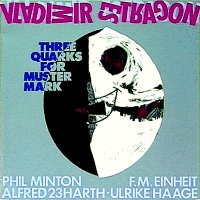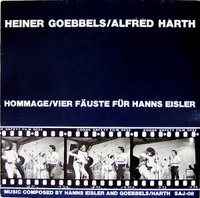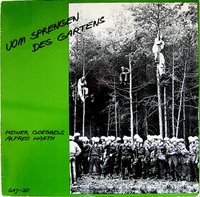VLADIMIR ESTRAGON - Three quarks for Muster Mark (TIPTOE)
Vladimir Estragon in Wikipedia

I maintain that internet is the best thing that could have happened to me in the last 15 years. If I still depended on the idiocy of record shops' personnel (who, at least on these shores, declare "out of print" everything they don't know - 95% of things - and when they miraculously have something difficult to obtain try to charge you twice the prices you'll see after a 10-minute search on the web) I'd have had a hard time discovering an album like this, an unnoticed, unsung treasure trove of good ideas, lively irony and astonishing artistry. Consisting of Alfred Harth (tenor sax and clarinets), Phil Minton (voice and trumpet), F.M. Einheit (metals and electronics) and the excellent Ulrike Haage (keyboards, sequencer programming and samples), Vladimir Estragon were a paradise of lusty electronic arrangements whose preset-derived poetry was poisoned by oblique complexities and sudden animations entering the picture when less expected; and this is only a fraction of the whole. Minton's typical parades of vocal characters depict a series of alternative abnormalities, as he accompanies absurd harmonic sequences with nonchalant schizophreny, often meshing his garbled glottology with the less consonant fruits from the rest of the group. And what about Harth's immediately recognizable, charming-but-challenging lines? Be it in a profound duo with Haage's piano (like in the initial "The warten") or leading a double-edge thematic exposition together with Minton's fiery trumpet, his playing remains connected with something that words can't give justice to, and that I can only define as "lyrically corporeal". Given Einheit's slightly more obscure role - but his duet with Minton in "Der verbleibende Haufen" is great - a special mention goes to Ulrike Haage, who composed the large part of the material with Harth; her programming sapience is a strong point of the disc, constituting an entertaining springboard for all members to unveil their more disguised influences; she also plays a mean piano and writes in styles that respectfully nod to Lars Hollmer and Lindsay Cooper, with an additional touch of tangential sweetness. Look for "Three quarks" with all your browsing power (better still, click on the above link), as this gem was released in 1989 and - unless they're using it as a gap filler somewhere - your "friends" at the record shop will probably tell you that it never existed.
In Touching Extremes
HEINER GOEBBELS / ALFRED HARTH - Hommage/Vier Fäuste für Hanns Eisler (FMP) - Vom Sprengen des Gartens (FMP)


We're in the middle of the seventies, punk and new wave thoroughly dominate the music world. Heiner Goebbels and Alfred Harth couldn't care less, though; their own time capsule contains the germs of true evolution and such a process cannot occur without an accurate study of the past. "Hommage" is just that: a tribute to Hanns Eisler through heartfelt versions of some of his songs and pieces, plus duo compositions that graciously nod to the great German artist. The album was recorded live in Berlin but luckily the audience is completely mixed out; we can thus enjoy robust doses of bloody virtuosity balanced by the peculiar mixture of modern and retro typical of Goebbels and Harth, a distinct trait that can be counted among the basic influences of many groups belonging to the Rock In Opposition area. "Vom Sprengen des Gartens" came out in 1979 and, from this receiver's spiritual point of observation, is a little more complex. In it, the two companions find many ways of exploring profound emotions with a preference towards an introspective melancholy, like in the intensely pensive "Almelo" on side B. Eisler is still revered, but there's also some Bach, Schumann and a gorgeous rendition of Rameau's "Le rappel des oiseaux". Both albums constitute a fulgid example of how respectfully music, whatever the genre, should always be treated. The enormous multi-instrumentalist abilities of both men (Goebbels a fantastic pianist and accordionist doubling on reeds, Harth a monster sax and clarinet player) are never used as an excuse for meaningless boring exercises. Offering coherent richness of expressive means and abundance of stirring playing, these two FMP releases should be regarded as milestones, while instead are criminally overlooked. Here's my hope of a fully detailed reissue of Goebbels and Harth's opera omnia - no compilations, please, we want them all and COMPLETE. Meanwhile, spend some eBay dollar on these two; I'll be returning soon to talk about the rest of this pair's production.
In Touching Extremes
Mr.Ricci's friendly wish had been fulfilled in 2007: a reissue of the two first Lps by the "Duo Goebbels/Harth" was released on Recommended Records,London.
.
Vladimir Estragon in Wikipedia

I maintain that internet is the best thing that could have happened to me in the last 15 years. If I still depended on the idiocy of record shops' personnel (who, at least on these shores, declare "out of print" everything they don't know - 95% of things - and when they miraculously have something difficult to obtain try to charge you twice the prices you'll see after a 10-minute search on the web) I'd have had a hard time discovering an album like this, an unnoticed, unsung treasure trove of good ideas, lively irony and astonishing artistry. Consisting of Alfred Harth (tenor sax and clarinets), Phil Minton (voice and trumpet), F.M. Einheit (metals and electronics) and the excellent Ulrike Haage (keyboards, sequencer programming and samples), Vladimir Estragon were a paradise of lusty electronic arrangements whose preset-derived poetry was poisoned by oblique complexities and sudden animations entering the picture when less expected; and this is only a fraction of the whole. Minton's typical parades of vocal characters depict a series of alternative abnormalities, as he accompanies absurd harmonic sequences with nonchalant schizophreny, often meshing his garbled glottology with the less consonant fruits from the rest of the group. And what about Harth's immediately recognizable, charming-but-challenging lines? Be it in a profound duo with Haage's piano (like in the initial "The warten") or leading a double-edge thematic exposition together with Minton's fiery trumpet, his playing remains connected with something that words can't give justice to, and that I can only define as "lyrically corporeal". Given Einheit's slightly more obscure role - but his duet with Minton in "Der verbleibende Haufen" is great - a special mention goes to Ulrike Haage, who composed the large part of the material with Harth; her programming sapience is a strong point of the disc, constituting an entertaining springboard for all members to unveil their more disguised influences; she also plays a mean piano and writes in styles that respectfully nod to Lars Hollmer and Lindsay Cooper, with an additional touch of tangential sweetness. Look for "Three quarks" with all your browsing power (better still, click on the above link), as this gem was released in 1989 and - unless they're using it as a gap filler somewhere - your "friends" at the record shop will probably tell you that it never existed.
In Touching Extremes
HEINER GOEBBELS / ALFRED HARTH - Hommage/Vier Fäuste für Hanns Eisler (FMP) - Vom Sprengen des Gartens (FMP)


We're in the middle of the seventies, punk and new wave thoroughly dominate the music world. Heiner Goebbels and Alfred Harth couldn't care less, though; their own time capsule contains the germs of true evolution and such a process cannot occur without an accurate study of the past. "Hommage" is just that: a tribute to Hanns Eisler through heartfelt versions of some of his songs and pieces, plus duo compositions that graciously nod to the great German artist. The album was recorded live in Berlin but luckily the audience is completely mixed out; we can thus enjoy robust doses of bloody virtuosity balanced by the peculiar mixture of modern and retro typical of Goebbels and Harth, a distinct trait that can be counted among the basic influences of many groups belonging to the Rock In Opposition area. "Vom Sprengen des Gartens" came out in 1979 and, from this receiver's spiritual point of observation, is a little more complex. In it, the two companions find many ways of exploring profound emotions with a preference towards an introspective melancholy, like in the intensely pensive "Almelo" on side B. Eisler is still revered, but there's also some Bach, Schumann and a gorgeous rendition of Rameau's "Le rappel des oiseaux". Both albums constitute a fulgid example of how respectfully music, whatever the genre, should always be treated. The enormous multi-instrumentalist abilities of both men (Goebbels a fantastic pianist and accordionist doubling on reeds, Harth a monster sax and clarinet player) are never used as an excuse for meaningless boring exercises. Offering coherent richness of expressive means and abundance of stirring playing, these two FMP releases should be regarded as milestones, while instead are criminally overlooked. Here's my hope of a fully detailed reissue of Goebbels and Harth's opera omnia - no compilations, please, we want them all and COMPLETE. Meanwhile, spend some eBay dollar on these two; I'll be returning soon to talk about the rest of this pair's production.
In Touching Extremes
Mr.Ricci's friendly wish had been fulfilled in 2007: a reissue of the two first Lps by the "Duo Goebbels/Harth" was released on Recommended Records,London.
.
<< Home